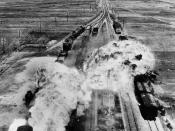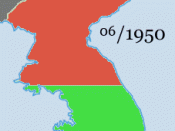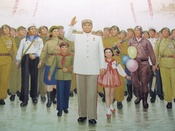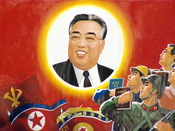Five years after Korea was partitioned into South and North Korea, the two countries began combating. Led by Kim Il Sung, the North launched a surprise invasion southwards on June 25th 1950. After nearly taking over the entire peninsula, American forces, alongside those of the United Nations, got involved in an attempt to drive the communists back. In due time the Chinese got involved in the conflict as well. This escalation brought forth what is today known as the Korean War. While searching for the grounds of this aggression, it is vital to acknowledge that causes are bound to be numerous in number.
Firstly, the fact that China had just become a communist state indeed presents itself as an important aspect of the commencement of the Korean War, as it lead to the United States putting more effort into stopping the spread of communism southward from North Korea. China falling victim to communism in October of 1949 was a major blow to the United States as it stood out as a failure of its containment policy, which was meant to stop the spread of communism, and opened up a completely new array of worries concerning the political standpoints of china's many neighboring nations, potential application of domino theory.
The United States therefore had little alternative but to immediately get itself involved in Korean hostility, as it had to demonstrate to the world its ability to overpower any communist threat to freedom. Thus, China's transformation to a communist state had indeed been a factor of the United States direct involvement in, and the escalation of, the Korean War. China's fall to communism also affected Stalin's stance on Kim Il Song's desire to invade South Korea. With China being the great new addition to the world's array of communist countries, Stalin's confidence in communism on as whole must have been soaring. In this light he gave his approval of Kim Il Song's wish to invade South Korea as he felt that communism was increasing in strength, that it was indeed slowly rising up around the world, and that the ideal had enough momentum to see through North Korea's timely triumph. This is important because without Stalin's approval it is highly possible that North Korea never would have invaded. Since March of 1949 North Korean leadership sought, as the source puts it, "...permission to liberate the South.". Not until Kim Il Song was given authorization by Stalin in early 1950 did North Korea even start preparing the invasion, and even so, assistance in coming up with ways and methods with which to carry out the attack was given to North Korea exclusively by the Soviet Union. It is surely no coincidence that Stalin's verification of North Korea's intentions very closely follows the transformation of China into a Communist state. Furthermore, the fall of China may very well have given Stalin the yearning for an eventually fully communist Asia, and any opportunity to dispose of the capitalist state that was South Korea with a minimal amount of effort should be appreciated. Thus it can be seen that China turning into a communist state was to some degree a cause of the Korean War.
The reaction of the United States to the invasion of South Korea surprised Kim Il Sung and Stalin, this may have contributed to the cause of the Korean War. The communists had reason to believe that the United States would not get involved in any conflict on the Korean Peninsula. Firstly, on 5th of January 1950 United States Secretary of State Dean Acheson gave a speech going over American foreign policy. In this speech, he outlined a basic perimeter of foreign countries the United States would defend with force from communist attack; he disregarded South Korea. Despite Acheson's later excuse of simple absent-mindedness, Stalin interpreted this as America stating that it would turn a blind eye to the Koreas in any case of hostility. It again is surely no coincidence that not even a month after Acheson's speech Stalin informed Kim Il Song that he was prepared to help him in the matter of invasion. Another reason Stalin doubted as to whether or not the Americans would get involved in the war is the fact that the Soviets had made public their successful detonation of an atomic bomb on the 29th of August 1949. It must be remembered that it was not until the Soviet archives were declassified in the 1990s that the United States knew Stalin's true position behind the Korean War, for all they knew in 1950, Stalin could have been holding an Atomic bomb intended for South Korea. It must have seemed too big a risk for America to take for the well-being of Korea, a place not even worthy of being mentioned in a speech made by the US secretary of state specifically naming countries the US would go to war for. Therefore it can be seen that the Soviet Union and North Korea had reason to believe that the US would not get involved in any conflict on the Korean Peninsula, however, the reasons behind what the United States actually did stated otherwise. The forefront of American foreign policy was containment, as well as its newest feature, NSC68. NSC68 was a report issued by the United States Security council in April of 1950, which spoke of the Soviet Union hell-bent on taking over the world through the spread of communism. Since the US acknowledged communism as being monolithic in nature, to combat the spread of communism anywhere would be synonymous with direct assault upon the Soviet Union's conquest. It thus called for not only massive military funding, an increase from five billion to 40 billion dollars a year, but also a change in its containment strategy from a strictly defensive character to that of an aggressive, military based nature. With this in mind, it can be seen that the Americans were to a certain extent anticipating the very likes of the North Korean invasion of South Korea. It would have been a travesty to go to this new extent of foreign policy and the likes thereof, only to shy away from real world application. Had the Americans backed down and not involved themselves in Korea after the invasion, it would have been a sign to the Soviet Union that the United States was not to be taken seriously, and quite possibly Soviet attempts on Berlin may have ensued.
It is an extremely important factor in examining causes of the Korean War that the US had passed NSC68, as historian of late have proclaimed that had Stalin been aware of its existence, he quite possibly may have never given Kim Il Sung the advance for the attack, and the entire Korean war extravaganza may never have taken place. Thus, it can be seen that the different views on America's potential involvement on the Korean peninsula played a large role in the conflict's escalation to the fully-fledged war.
The Korean War claimed more than 2.5 million lives, lives of people from all walks of life. With a war that reaches so deep into the ÃÂdepths of darknessÃÂ, it can be concluded that to settle on a certain set of causes, it must be taken into account the layer at which the causes are presented. Furthermore one can provide perspective and take insight one step further, yet so as not to find oneself in un-chartered territory after running for some time on a tangent, an objective point of reference must be made which orients itself accordingly. We have yet to see the end of the Korean War and until then, its causes will have direct relevance in a world which has no means to be forgotten. 'Work Cite1.ÃÂKorean War." Encyclopedia Britannica. 2008. Encyclopedia Britannica Online. 3 May 2008 .
2.Brummett, Palmira, Robert Edgar, Neil Hackett, George Jewsbury, and Barbara Molony. Civilization Past & Present. 11thth ed. New York City: Pearson Education, 2005.
3.Brune, Lester and Robin Higham, eds., The Korean War: Handbook of the Literature and Research (Greenwood Press, 1994)4.Evanhoe, Ed. http://www.korean-war.com/. 16 Apr. 2008. 24 Apr. 20085.Kaufman, Burton I. The Korean Conflict (Greenwood Press, 1999)6.Koreanwar.Org. 03 May. 2008. 22 Apr. 2008





